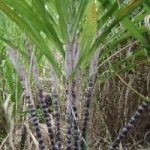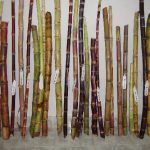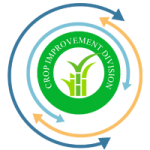
Crop Improvement Division
“Increase productivity and profitability of the sugar industry through incorporation of better sugarcane varieties for commercial cultivation”
-------Quick Menu-------
The Crop Improvement Division (CI) focuses on conventional breeding for the development of sugarcane varieties with the following characteristics, suitable for commercial cultivation in different Agro-ecological regions of Sri Lanka.
- High sugarcane yield
- High sugar yield
- Pest and disease resistant
The projects, tissue culture of sugarcane varieties, and biotechnology research assist the non-conventional sugarcane breeding in the creation of genetic variability through the exploitation of somaclonal variation and classification & identification of genetic variability in the development of new sugarcane varieties.

Our Achievements
Variety extend of Sugarcane in Sri Lanka (2022)

Divisional Priority Areas...
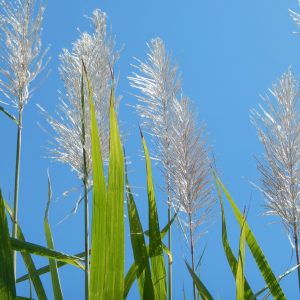
Germplasm Collection
Collection, conservation, evaluation, and utilization of Saccharum germplasm for the development of new, improved sugarcane varieties with better commercial attributes, such as high cane yield, high sucrose content, resistance to pests and diseases, adaptability to adverse environmental conditions, and desirable morphological characteristics
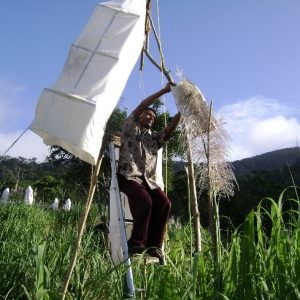
Hybridisation of sugarcane
Hybridisation of sugarcane to develop varieties with high yields (cane yield and sugar yield), resistance to major sugarcane diseases, good ratooning ability, early, mid, & late maturity, and tolerance to drought for rain-fed and irrigated cultivation in different sugarcane growing areas of Sri Lanka
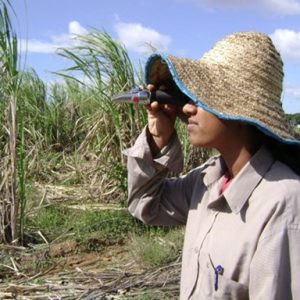
Selection of sugarcane clones
Selection of sugarcane clones with commercial attributes, identification of proven parents and effective crossing combinations, selection of true hybrids from inter-specific, inter-generic, and backcrosses in the noblization of wild species, and generation of high-sucrose parental stocks through recurrent selection
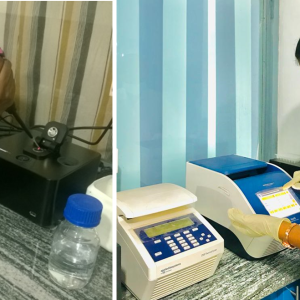
Studying molecular biology
Studying molecular biology of sugarcane varieties to identify genetic relatedness and distinctness among commercial and locally-collected sugarcane varieties (DUS ((Distinctness, Uniformity, and Stability) testing), confirm the identity of varieties and avoid mixing of varieties, identify true hybrids, Identify the existing markers for high-yielding varieties and disease resistance, and to adopt marker-assisted selection (MAS) in the existing breeding program
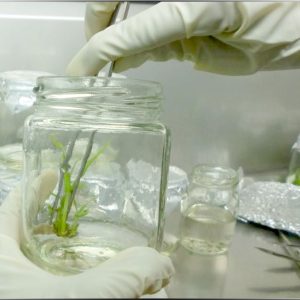
Tissue culture
Tissue culture of sugarcane to develop new sub-clones resistant to WLD/GSD and smut diseases from disease-susceptible, high-yielding varieties, to produce disease-free planting materials from newly released varieties for rapid multiplication through in-vitro culture and lateral shoot multiplication under poly tunnel conditions, and to produce in-vitro cultured materials for varietal export.
Sugarcane varieties recommended for commercial cultivation in Sri Lanka

SL 96 128

CO 775

SLI 121 (F 148)


Ongoing Research Activities..
CI/23/01: Collection, conservation, evaluation and utilization of Saccharum germplasm
The genetic diversity of the sugarcane germplasm collection is enriched for the development of new improved sugarcane varieties with better commercial attributes, such as high cane yield, high sucrose content, resistance to pest and diseases, adaptability to adverse environmental conditions and good morphological characteristics.
The genetic diversity of sugarcane germplasm is required to be conserved ex-situ for further use, especially in crop improvement. The Sugarcane Research Institute conserves the Saccharum germplasm collection at the Sugarcane Breeding Station, Enselwatte, Deniyaya, Sri Lanka.
It is comprised with 1,659 accessions assembled through foreign and local sources such as commercial and near-commercial sugarcane varieties, progenies of inter- and intra- specific crosses and locally collected accessions through local expedition.
Among the basic Sacchurum species; accessions from S. officinarum, S. spontaneum, the related wild genera; Erianthus spp. accessions and an accession of Miscanthus japonica are maintained.
Objectives and targets
Improvement of genetic diversity of the Saccharum germplasm collection by adding new accessions and conservation of existing sugarcane genetic diversity.
Assessment of parental worth in Saccharum germplasm for cane and sugar yields and their components.
Development of core-collections for directional breeding for high yield, high sucrose content.Evaluation of imported varieties in different sugarcane growing areas in Sri Lanka.
CI/23/02: Development and selection of new sugarcane varieties
This research project is conducted to increase the productivity by developing and recommending new sugarcane varieties and minimizing the risk of sugarcane crop losses due to biotic and abiotic stress through increasing varietal spectrum in commercial plantations in different sugarcane growing areas.
Parental selection, sugarcane hybridization, and variety selection for good commercial attributes are the major steps in variety development program.
To make sure the superiority of varieties commercially, the clones are selected based on high cane yield, high sucrose content, moderate fibre content, maturity times, ratooning ability, tolerance to drought, wide and specific adaptability, good morphology and milling qualities using selection indices with multiple trait selection criteria in different stages of clonal selection and finally will be tested for wide adaptability for different agro ecological zones.
Objectives
- Development of high yielding, early-, mid- and late maturing sugarcane varieties for different sugarcane-growing conditions in Sri Lanka with the characteristics of good ratooning ability, resistant to pest and diseases (WLD, smut and leaf scald), drought tolerance, and suitable for mechanization.
- Generating high-sucrose genetic stocks to be used as parental clones.
- Improvement of basic Saccharum officinarum population in breeding attributes and commercial attributes along the selection stages for commercial adoption.
Following steps are involving in sugarcane variety development program.


CI/23/03: Biotechnological applications for sugarcane variety improvement
Biotechnological interventions hold great promise to address to enhance productivity of sugarcane to improve sugarcane varieties with disease resistance and to improve quality of the crop. These approaches for sugarcane improvement have been applied in Sugarcane Research Institute, Sri Lanka in the areas of tissue culture, molecular diagnostics of sugarcane pathogens, development of genetic maps using molecular markers, molecular testing of plants for variety identification and molecular characterization of various traits.
Objectives
Produce disease-free planting materials from newly-released varieties for primary nurseries and produce in-vitro-cultured materials for varietal exportation
Induce genetic variability of selected sugarcane varieties through callus culture technique with artificial mutagens and evaluation of superior genotypes from mutant plant population
Evaluation and characterization of sugarcane germplasm accessions using molecular markers to broaden the genetic diversity through directional breeding
Minimize the time and resources required for maturity testing by adopting the molecular method for testing maturity.
Identification of QTLs for high sugar content in sugarcane and smut disease resistance.
Development of marker-assisted selection protocols for high sugar and smut disease resistance
Evaluation of genetic variability of sugarcane varieties through in-vitro mutagenesis in callus culture technique

Gene expression studies related to the sugar content and maturity of varieties
Detection of QTL for sugar content and Smut resistance

CI/23/03: Development and selection of sugarcane varieties for organic farming

This project is initiated to evaluate commercial sugarcane varieties under organic fertilizer and identify suitable sugarcane varieties for organic farming and develop new sugarcane varieties for organic farming system.
Objective
Selection of suitable sugarcane varieties for organic farming
Publications
Peer-Reviewed / SCI Journals
- Kong, C.Y., Wickramasinghe, K.P., Xu, C.H., Mao, J., Liu, H.B., Kumar, T., Lin, X.Q., Li, X.J., Tian, C.Y., Zhao, P.F. and Lu, X., 2025. Recent Advances in Sugarcane Leaf Scald Disease: Pathogenic Insights and Sustainable Management Approaches. Plants, 14(4), p.508. https://doi.org/10.3390/plants14040508
- Perera, A.M.M.S., Attanayaka, D.P.S.T.G. and Wijesuriya, A. (2024). Assessment of genetic diversity in the Saccharum germplasm of Sri Lanka. Pakistan Sugar Journal. 39 (1): 05-16.
- Wickramasinghe, K.P., Mao, J., Xu, Ch. et al.Comparative Analysis of Seven Endogenous Hormones in a Novel Dual-axillary Bud Mutant Genotype of Sugarcane. Sugar Tech 26, 1590–1600 (2024). https://doi.org/10.1007/s12355-024-01430-z
- Wickramasinghe, K.P., Kong, C.Y., Lin, X.Q., Zhao, P.F., Mehdi, F., Li, X.J., Liu, X.L., Mao, J. and Lu, X., 2024. Photoperiodic and lighting treatments for flowering control and its genetic regulation in sugarcane breeding. Heliyon, Volume10 (7), https://doi.org/10.1016/j. heliyon.2024.e28531
- Mehdi, F., Galani, S., Wickramasinghe, K.P., Zhao, P., Lu, X., Lin, X., Xu, C., Liu, H., Li, X. and Liu, X., 2024. Current perspectives on the regulatory mechanisms of sucrose accumulation in sugarcane. Heliyon. Volume 10 (5), https://doi.org/10.1016/j.heliyon.2024.e27277
- Maralanda, S.M.T.A., Ariyawansha, B.D.S.K., sewwandi, M.G.G.N., Wickramasinghe, K.P., Wijesuriya, A. (2024). Evaluation of Some Promising Sugarcane Varieties for Quality Jaggery Production, Agrica, 13/271-274. http://doi.org/10.5958/2394-448x.2024.00035.5
- Perera, A.M.M.S., Wijesuriya, A., Sumedha Thushari, A.N.W., Attanayaka, D.P.S.T.G. and Wijesuriya, N.D. (2023). Evaluation and Characterization of Saccharum Germplasm for Sugarcane Breeding in Sri Lanka. Tropical Agricultural Research (2023). 34(1): 52-64.
- Wickramasinghe, K.P., Wijesuriya, A., Ariyawansha, B.D.S.K., Perera, A.M.M.S., Chanchala, K.M.G., Manel, D. and Chandana, R.A.M., 2019. Performance of Sugarcane Varieties in a White Leaf Disease (WLD)—Prone Environment at Pelwatte[online]
- Rathnayaka, R.M.B.S., Wijesuriya, A., Perera, A.M.M.S. and Alwis, L.M.H.R. (2013). Optimal Phyto-hormone Levels for Meristem Culture of Sugarcane (Saccharum hybrid spp.): Variety SL 96 328. Journal of the National Institute of Plantation Management, (2013), 27(02): 44-51.
Abstracts/ Extended Abstract /Conference papers
- Gamage, G. N. H., Perera A. M. M. S., Widana Gamage, S. M. K.. Assessment of genetic diversity of sugarcane germplasm in Sri Lanka using SSRs. 8th International Research Conference, Uwa Wellassa University – 2024 (IRCUWU-2024), Uwa Wellassa University, Badulla. 2024, pp. 401.
- Gamage, D. G. P. D., Gunasena, M. D. K. M., Perera, A. M. M. S., Thushari, A. N. W. S. and Perera, J. K. U. D.,. Evaluation of Mutation Variability and Disease Resistance in Sugarcane (Saccharum spp. hybrid) Populations Developed through Callus Culture. 5th International Conference of Agricultural Sciences (AgInsight 2024), Sabaragamuwa University of Sri Lanka. 2024, pp. 08.
- Chaturya, P. J., Perera A. M. M. S., Gunasena, M. D. K. M. and Dayasena, Y. A. P. K., Identification of true-hybrids of the Saccharum officinarum and Erianthus arundinaceus progenies by molecular markers. Undergraduate Research Symposium of Technology & Applied Sciences (APSURS). Sabaragamuwa University of Sri Lanka. 2024, pp. 17.
- Sumedha Thushari, A. N. W., Wijesuriya, A., Perera, A. M. M. S. and Wijesuriya B. W. Identification of parents for breeding sugarcane leaf scald disease resistance from Saccharum germplasm, 24th Australasian Plant Pathology Society Conference 2023.
- Perera A. M. M. S., Attanayaka D. P. S. T. G. and Wijesuriya A., Characterization of Exotic Parental Varieties of Sugarcane (Saccharum spp. hybrid) by SSR Markers. Wayamba University Research Congress – 2022, Kuliyapitiya, Sri Lanka, 2022: 25-26.
- Perera, A.M.M.S., Wijesuriya, A., Thushari, A.N.W.S., Attanayaka, D.P.S.T.G. and Wijesuriya, N.D., Evaluation and Characterization of Saccharum Germplasm for Sugarcane Breeding in Sri Lanka. 34th Annual Congress of the Postgraduate Institute of Agriculture, Peradeniya, Sri Lanka. 2022: pp. 9.
- Perera, A.M.M.S. (2022). Sugarcane is a rich germplasm: why not exploit it properly in producing improved cultivars? Hanthana Essence, PGIA congress in brief, Peradeniya, Sri Lanka, 2022: 11.
- Perera, A.M.M.S., Wijesuriya, A., Sumedha Thushari, A.N.W. and Wijesuriya, B.W., Unveiling Indigenous Pure Saccharum officinarum Cultivars for Manufacturing Organic Raw Cane Sugars. First National Research Symposium, Colombo, Sri Lanka. 2022: 55-58.
- Perera, A.M.M.S., Attanayaka, D.P.S.T.G., Wijesuriya, A., Genetic Diversity within Saccharum officinarum Accessions Collected in Sri Lanka. Wayamba University Research Congress – 2021, Kuliyapitiya. Sri Lanka. 2021: 23-24.
- Balagalla, D.N., Wijesuriya, A., Ranathunge, N.P. and Perera, A.M.M.S., A Protocol for In-vitro Direct Plant Regeneration from Leaf Tissue for Micropropagation of Sugarcane. Twenty Ninth Annual Congress of the PGIA. Peradeniya, Sri Lanka. 2017: 7.
Bulletin/Puwath/Newspaper articles
- Chaturanga, A., Perera A.M.M.S., Wickramasinghe, K. P., and Maralanda, A., Puwath Hasuna, Sugarcane Research Institute, Uda Walawe, Sri Lanka, August 2024: pp. 8.
- Ariyawansha, B.D.S.K., Perera A.M.M.S., Chaturanga, A. and Sewwandi, N., “Puwath Hasuna”, Sugarcane Research Institute, Uda Walawe, Sri Lanka, August 2022: 4-5.
- Perera, A.M.M.S., Wijesuriya, A., Sumedha Thushari, A.N.W. and Wijesuriya, B.W., (2020). Sugarcane Germplasm Catalogue e-version. Sugarcane Research Institute, Uda walawe, Sri Lanka.
- Kodituwakku, K.A.D., Perera A.M.M.S., Abeyrathne, K.H.D., Economic Assessment of Production of Sugarcane Seed Cane using Meristem-cultured Plants. Sugarcane Research Institute, Uda Walawe, Sri Lanka. 2017.
- “Uk waga kereema” (2016). Sugarcane Research Institute, Uda Walawe. 1-3.
Books / Book Chapters
Advisory Circulars
Patents
Other publications
Our Staff..

Dr. (Mrs.) Malika Perera
Senior Research Officer
Ph.D, Wayamba University, Sri Lanka
M.Sc, University of Colombo
M.Sc, University of Colombo
Research Interest:
- Molecular biology
- Sugarcane breeding
- am_malikap@yahoo.com
- amalikamsp@gmail.com
- ResearchGate
- ORCiD
- Google Scholar

Mr. K. P. Wickramasinghe
Research Officer
M.Phil, University of Ruhuna
B.Sc, University of Ruhuna
Research Interest:
- Genetics
- Plant breeding
- wickramasinghekp@gmail.com
- kpwickrama@sugarres.lk
- ResearchGate
- ORCiD
- Google Scholar

Mr. K. P. Wickramasinghe
Research Officer
B.Sc, University of Peradeniya
Research Interest:
- Conventional breeding
- Tissue culture
- maskelum@sugarres.lk
- maskelum94@gmail.com
- ResearchGate
- ORCiD
- Google Scholar

Ms. P. P. G. S. P. Bandara
Research Officer
M.Sc, University of Peradeniya
B.Sc, University of Peradeniya
Research Interest:
- –
- –
- sachika@sugarres.lk
- sachikapriyaa@gmail.com
- ResearchGate
- ORCiD
- Google Scholar

Mr. D. Weerasinghe
Senior Technical Officer
Job Role: Assisting research staff for research

Mr. M.K.D. Ubesena
Technical Officer
Job Role: Assisting research staff for research

Ms. K. P. Harshani
Technical Officer
HND (Agri)
Job Role: Assisting research staff for research
























